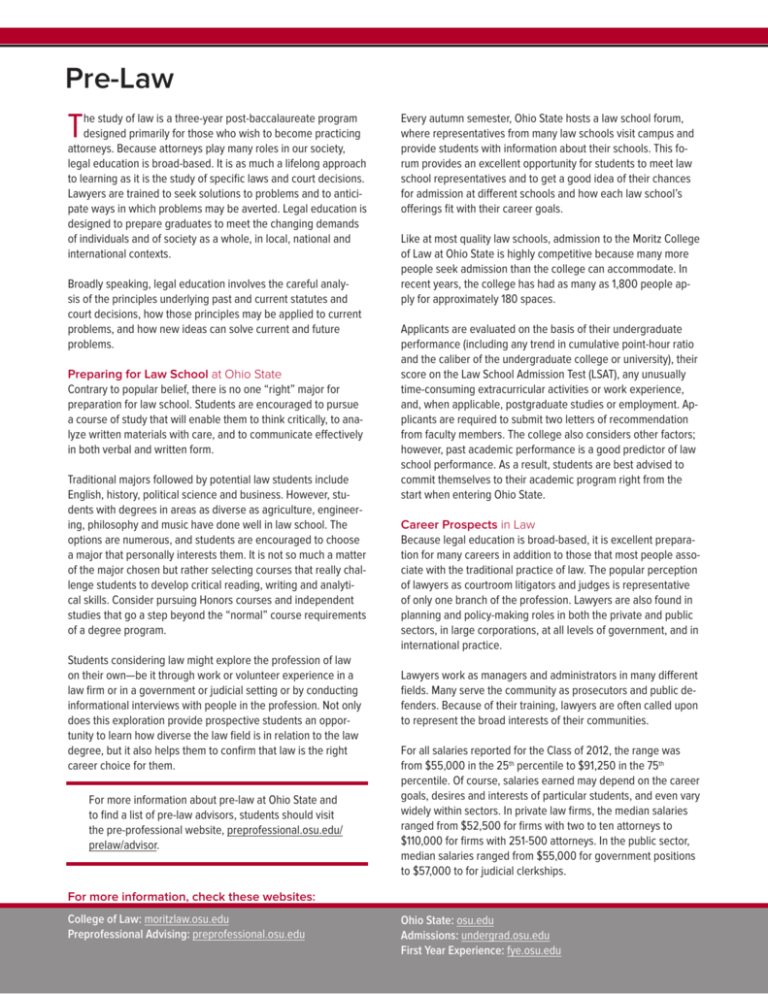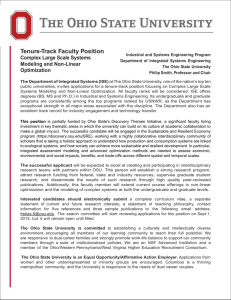Pre-Law - Undergraduate Majors at OSU
advertisement

Pre-Law T he study of law is a three-year post-baccalaureate program designed primarily for those who wish to become practicing attorneys. Because attorneys play many roles in our society, legal education is broad-based. It is as much a lifelong approach to learning as it is the study of specific laws and court decisions. Lawyers are trained to seek solutions to problems and to anticipate ways in which problems may be averted. Legal education is designed to prepare graduates to meet the changing demands of individuals and of society as a whole, in local, national and international contexts. Broadly speaking, legal education involves the careful analysis of the principles underlying past and current statutes and court decisions, how those principles may be applied to current problems, and how new ideas can solve current and future problems. Preparing for Law School at Ohio State Contrary to popular belief, there is no one “right” major for preparation for law school. Students are encouraged to pursue a course of study that will enable them to think critically, to analyze written materials with care, and to communicate effectively in both verbal and written form. Traditional majors followed by potential law students include English, history, political science and business. However, students with degrees in areas as diverse as agriculture, engineering, philosophy and music have done well in law school. The options are numerous, and students are encouraged to choose a major that personally interests them. It is not so much a matter of the major chosen but rather selecting courses that really challenge students to develop critical reading, writing and analytical skills. Consider pursuing Honors courses and independent studies that go a step beyond the “normal” course requirements of a degree program. Students considering law might explore the profession of law on their own—be it through work or volunteer experience in a law firm or in a government or judicial setting or by conducting informational interviews with people in the profession. Not only does this exploration provide prospective students an opportunity to learn how diverse the law field is in relation to the law degree, but it also helps them to confirm that law is the right career choice for them. For more information about pre-law at Ohio State and to find a list of pre-law advisors, students should visit the pre-professional website, preprofessional.osu.edu/ prelaw/advisor. Every autumn semester, Ohio State hosts a law school forum, where representatives from many law schools visit campus and provide students with information about their schools. This forum provides an excellent opportunity for students to meet law school representatives and to get a good idea of their chances for admission at different schools and how each law school’s offerings fit with their career goals. Like at most quality law schools, admission to the Moritz College of Law at Ohio State is highly competitive because many more people seek admission than the college can accommodate. In recent years, the college has had as many as 1,800 people apply for approximately 180 spaces. Applicants are evaluated on the basis of their undergraduate performance (including any trend in cumulative point-hour ratio and the caliber of the undergraduate college or university), their score on the Law School Admission Test (LSAT), any unusually time-consuming extracurricular activities or work experience, and, when applicable, postgraduate studies or employment. Applicants are required to submit two letters of recommendation from faculty members. The college also considers other factors; however, past academic performance is a good predictor of law school performance. As a result, students are best advised to commit themselves to their academic program right from the start when entering Ohio State. Career Prospects in Law Because legal education is broad-based, it is excellent preparation for many careers in addition to those that most people associate with the traditional practice of law. The popular perception of lawyers as courtroom litigators and judges is representative of only one branch of the profession. Lawyers are also found in planning and policy-making roles in both the private and public sectors, in large corporations, at all levels of government, and in international practice. Lawyers work as managers and administrators in many different fields. Many serve the community as prosecutors and public defenders. Because of their training, lawyers are often called upon to represent the broad interests of their communities. For all salaries reported for the Class of 2012, the range was from $55,000 in the 25th percentile to $91,250 in the 75th percentile. Of course, salaries earned may depend on the career goals, desires and interests of particular students, and even vary widely within sectors. In private law firms, the median salaries ranged from $52,500 for firms with two to ten attorneys to $110,000 for firms with 251-500 attorneys. In the public sector, median salaries ranged from $55,000 for government positions to $57,000 to for judicial clerkships. For more information, check these websites: College of Law: moritzlaw.osu.edu Preprofessional Advising: preprofessional.osu.edu Ohio State: osu.edu Admissions: undergrad.osu.edu First Year Experience: fye.osu.edu Pre-law Opportunities at Ohio State There are a number of advantages in pursuing undergraduate education at Ohio State in preparation for law school. At the time of freshman application to the university, students will be asked to choose a major as well as to indicate an interest in the pre-law option. By indicating an interest in pre-law, admitted undergraduate students will receive information periodically from the university’s pre-law advisors about pre-law resources and events on campus. Students are encouraged to meet early in their academic careers with the designated pre-law advisor in their academic area. Pre-law advisors work with students to integrate the course work required for their intended major with course work that should foster the development of the critical skills necessary to be a successful law student. Whatever undergraduate major is chosen, students should contact an advisor in the Colleges of Arts and Sciences early each fall to get information about the annual law school forum at Ohio State. By talking with representatives from many different law schools, students can get a good idea of their chances for admission at different schools, and how each law school’s offerings fit with their career goals. The undergraduate law fraternity, Phi Alpha Delta (PAD), is a professional service organization for pre-law students at Ohio State that assists students in making informed decisions about selecting law as a career, deciding which law school to attend, preparing for law school and understanding the practice of law. PAD coordinates a variety of education events, such as panel discussions, tours, seminars and debate. Traditionally, participants at these events include lawyers, current Ohio State law students and law graduates who may be using their degrees in different career paths. Law Requirements There is no set curriculum for the nation’s 202 American Bar Association-approved law schools. However, most law schools offer very similar courses to help prepare their graduates to pass a state bar examination. Most states test on areas of the law common to all jurisdictions, such as contracts, torts, civil procedure, criminal law and procedure, evidence, taxation, domestic relations, legal research and writing, constitutional law, ethics, administrative law, corporate law, property, and commercial law. The college also offers eight clinics in which students represent clients under close faculty supervision. In addition, students may spend a summer studying in England through the college’s program with the University of Oxford. A law student who wishes to gain in-depth experience in a second field of study may enroll as a combined-degree candidate in one of the established joint-degree programs: the JD/ MBA (Master of Business Administration), JD/MA (Master of Arts in Public Policy and Management), or the JD/MHA (Master of Health Administration). Select students enrolled in the College of Medicine and Public Health may also pursue a JD/MD or a JD/MPH. Law students also are permitted to individually tailor a joint-degree program with many of the university’s 100-plus master’s programs and 90 PhD programs. In recent years, law students have enrolled in individually designed joint degrees in political science, higher education administration, social work, women’s studies, African American studies, molecular genetics, urban and regional planning, and philosophy. More About the Moritz College of Law at Ohio State • Graduates of the College of Law c an be found in all 50 states and many foreign countries. Graduates include current and former U.S. senators, governors of the State of Ohio, members of the Ohio Supreme Court and other courts, as well as practicing attorneys in all sizes of law firms. • The College of Law student to faculty ratio is 15:1, among the lowest of all U.S. law schools. • The College of Law’s Alternative Dispute Resolution program is considered to be among the top in the nation, while the College of Law ranks among the nation’s top 20 public law schools according to a survey released in March 2002. • In 2013, the College of Law at Ohio State is ranked 36th of the 202 American Bar Association approved law schools. • The College of Law at Ohio State has the 14th largest law library in the country. • 100–150 law firms, corporations, government agencies and other employers from across the country visit campus to interview law students annually. In The Ohio State University Moritz College of Law, students are required to take contracts, torts, property, legislation, criminal law, constitutional law, civil procedure, and legal research and writing in the first year. The following upper-level courses are also highly encouraged and/or required for graduation: Appellate Practice, one course with substantial writing, one course with a skills perspective on the law and course work in legal ethics. The remainder of the curriculum is elective. Popular courses include trial law and practice, legal clinics, criminal law, alternative dispute resolution, international law, and intellectual property. Revised November 2013. Information subject to change. For the most up-to-date information about preparing for law school at Ohio State, please visit preprofessional.osu.edu/pre-lawprogram. Contact information: Arts and Sciences Advising and Academic Services 100 Denney Hall | 164 West 17th Avenue Columbus, Ohio 43210-1391 | 614-292-6961







